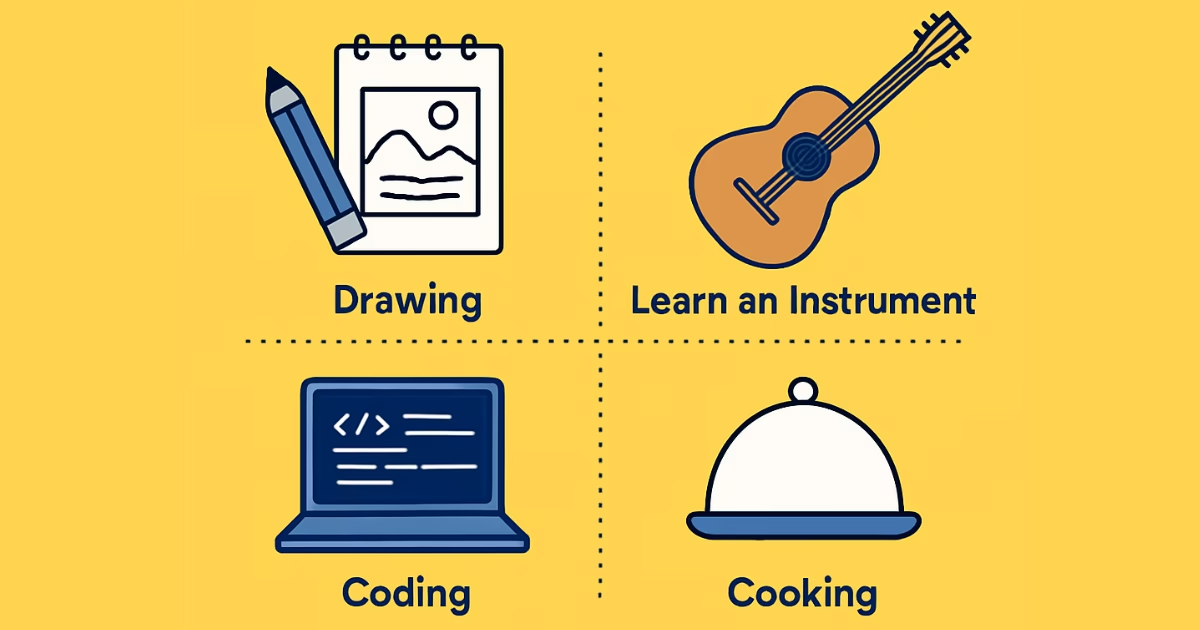Boredom is something everyone experiences from time to time, whether it’s during a long weekend, a quiet evening, or unexpected free time. But what many people don’t realize is that boredom can actually be an opportunity for personal growth and creativity. Instead of wasting hours scrolling through social media or watching random videos, you can use that time to develop yourself and pick up new abilities. There are countless skills to learn when bored that can help improve your life, whether it’s boosting your creativity, improving mental sharpness, or learning practical tasks you’ve always put off. These skills not only keep your mind active but also give you a sense of achievement and joy. In this article, we’ll explore a wide range of interesting and useful skills that anyone can start learning when boredom strikes.
Top Skills to Learn When Bored
Boredom doesn’t have to be wasted time. With a little curiosity, anyone can turn that idle moment into something productive and fun. Here’s a detailed list of skills to learn when bored that can help people grow, explore their passions, and maybe even surprise themselves.
Creative Skills to Spark Your Imagination
Creativity is often one of the first things people ignore when they’re busy, but it’s the perfect outlet when boredom strikes. Simple activities like drawing or sketching can help clear the mind and improve focus.
For those who enjoy colors and texture, painting with watercolors or acrylics can be very calming. It doesn’t need to be fancy — even painting abstract shapes or color patterns can bring joy.
Writing is another great creative escape. Whether it’s journaling, poetry, or short stories, writing sharpens the mind and helps express feelings.
Photography is easier than ever with smartphones. People can learn about framing, light, and editing using free apps. Even taking pictures of everyday things can become an art form when seen through a creative lens.
Academic and Mental Skills to Sharpen Your Mind
Boredom can be the perfect time to challenge the brain. Speed reading, for example, is a useful skill that helps people process information faster, which comes in handy at school or work.
Learning a new language is another fantastic mental workout. Apps like Duolingo or Babbel offer fun ways to pick up the basics. Just a few minutes a day can make a difference over time.
Critical thinking and brain games help improve problem-solving abilities. Puzzles, chess, and logic games are excellent tools for this.
Public speaking is a skill many people avoid, but practicing in front of a mirror or recording small speeches can boost confidence and communication skills.
Digital & Tech Skills for the Modern Age
In today’s world, digital skills are extremely valuable. Coding is one of the most practical skills to learn when bored. Websites like FreeCodeCamp or Codecademy make learning coding basics like HTML, CSS, or Python accessible for beginners.
Graphic design is another exciting option. Tools like Canva or Figma allow people to experiment with design even without experience.
Video editing is now possible with free or low-cost software. Learning to cut clips, add music, and create transitions can open up fun creative projects.
Excel or Google Sheets might sound boring, but mastering basic formulas and charts can be surprisingly rewarding — and it looks great on a resume.
Practical Life Skills to Build Independence
Practical skills are often overlooked, yet they can have a big impact on everyday life. Cooking is one of the most useful things to learn. Trying new recipes or improving basic techniques, like chopping or seasoning, is fun and rewarding.
Basic home repairs, such as fixing a leaky faucet or hanging shelves, can save money and boost confidence.
Personal finance is another important skill. Learning how to budget, track expenses, and understand basic investments is valuable at any age.
First aid knowledge is often forgotten, but it’s one of the most critical life skills. Taking time to learn CPR or how to handle small injuries could someday save a life.
Musical and Performance Skills for Fun
Music has a way of lifting boredom instantly. Learning an instrument like the guitar, ukulele, or keyboard can be both enjoyable and relaxing. Many people think they need lessons, but there are countless free tutorials online.
Singing or vocal training can also be a great outlet. Even singing along to favorite songs can help improve pitch and control.
Dancing is another mood booster. Whether it’s learning salsa, hip-hop, or just simple moves, dancing keeps the body moving and the mind happy. Online classes and videos make it easy to follow along at home.
Fitness and Wellness Skills for a Healthy You
Physical activity is one of the best ways to fight boredom. Yoga and Pilates improve flexibility, strength, and mental calm. They don’t require much space or equipment, making them perfect for home practice.
Bodyweight exercises like push-ups, squats, and planks build strength without the need for a gym.
Meditation and mindfulness practices help calm the mind and reduce stress. Even just five minutes of quiet breathing can make a big difference.
Breathwork techniques, such as box breathing or the Wim Hof method, are also gaining popularity as ways to improve focus and well-being.
DIY and Craft Skills for Hands-on Creativity
For those who like working with their hands, DIY crafts are some of the best skills to learn when bored. Knitting, crocheting, or sewing can be incredibly satisfying. Beginners can start with simple projects like scarves or pillowcases.
Woodworking is another rewarding hobby. Small projects, like building shelves or making a birdhouse, can be done with minimal tools and materials.
Origami and paper crafts are fun, inexpensive, and great for improving focus.
Jewelry making, whether with beads, wire, or simple metalwork, is a creative outlet that also produces beautiful results.
Social and Communication Skills
Boredom is a good time to work on social and communication skills. Online networking on platforms like LinkedIn helps people connect professionally and opens up new opportunities.
Negotiation and persuasion are valuable in many areas of life, from business to everyday situations. Books, online courses, or even practice conversations can help improve these abilities.
Active listening is an underrated skill that strengthens relationships. Practicing listening without interrupting or judging can make a big difference in personal and professional life.
Tips to Stay Motivated While Learning New Skills
Even with the best intentions, staying motivated can be tough. The key is to start small. Just ten to twenty minutes a day is enough to build momentum.
It’s also important to choose skills that genuinely excite you. Forcing yourself to learn something boring won’t last long.
Tracking progress helps keep motivation high. Whether it’s a notebook, app, or simple checklist, seeing improvement can be very satisfying.
Finally, remember that mistakes are part of the process. No one becomes an expert overnight. The goal is to enjoy learning, not to be perfect.
Also Read: 25 Weird Laws Around the World That Still Exist Today
Final Thoughts on Skills to Learn When Bored
Boredom doesn’t have to be a negative experience. With the right mindset, it can become a doorway to self-improvement, creativity, and fun. There are endless skills to learn when bored that can boost your mind, body, and spirit.
Whether it’s trying something artistic, picking up practical knowledge, or exploring a new hobby, each small step builds confidence and joy. Next time boredom strikes, remember — it’s not wasted time unless you let it be. Choose one skill, take the first step, and watch how your free time transforms into something meaningful and fulfilling.
FAQs
1. What are the best skills to learn when bored at home?
Some of the best skills include cooking, drawing, learning a new language, coding, and practicing meditation. These are fun, useful, and easy to start.
2. How can I stay motivated to learn new skills when bored?
Start small, choose skills that truly interest you, track your progress, and don’t be afraid to make mistakes. Enjoying the process keeps motivation high.
3. Can I learn useful skills online for free?
Yes! Many websites offer free courses in coding, design, languages, and more. YouTube and learning apps are also great places to start.
4. How long does it take to learn a new skill?
It depends on the skill and your time commitment. Even practicing 15–30 minutes daily can show progress within a few weeks.

Hi, I’m Shafy Ali – a curious mind and passionate writer at Celiac Magazine. I cover a little bit of everything, from everyday tips and how-tos to deeper dives into topics that spark conversation. I enjoy turning research into readable, relatable content that informs and inspires. Whatever the subject, I aim to keep it clear, engaging, and genuinely useful.

